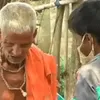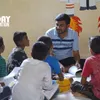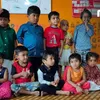Project Telecation aims to impart learning in remote areas without using the internet
Using IVR technology, the team at Project Telecation aims at improving the state of education in rural areas, with limited to no internet facilities.
The ongoing COVID-19 pandemic has impacted the learning behaviour of over 320 million learners in India and forced them to adapt e-learning modules. This shift has highlighted the long-standing issues of inequality, digital disparity among urban and rural children, learning infrastructure in the rural areas, education, and digitisation policy.
This brings us to our next question — how does one solve them?
Enter Project Telecation - an education initiative, established in September 2020 by five Indians, who witnessed the growing digital divide between students with limited or no internet access. The project enables Interactive Voice Response (IVR)-based audio education and volunteer assistance to children in rural India.
Co-founders Akin Babu Joseph (23), Rahul Jayanth (23), Sezel Lalwani (27), Shruthi Mohan (27), and Shubham Swaroop (22), who belong to different walks of life, came together for the ‘Regional TechCamp on Good Governance 2020.’ The event was organised by Kathmandu Living Labs (KLL), in partnership with the US Embassy in Kathmandu, Nepal.
The five finalists from India were chosen from 500 applications received from all five South Asian countries - Nepal, Pakistan, India, Bangladesh and Sri Lanka. The team members haven’t met each other yet, but are executing the project virtually.
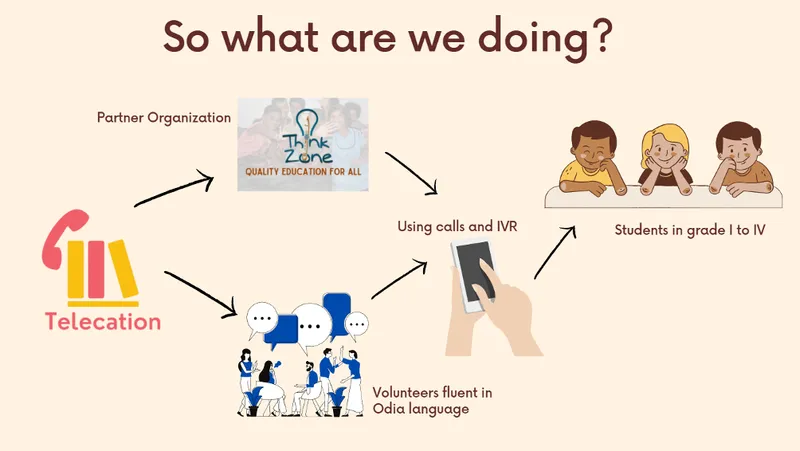
The pilot of Telecation
Project Telecation’s pilot project was executed in Odisha in partnership with NGO . Using a 'tech-plus-touch' model and activity-based methodology, the NGO works towards improving the educational outcomes of children from under-resourced communities.
“They were working on some great impact projects in Odisha, India. We decided to run our pilot project in collaboration with them and had multiple calls with the founder Binayak Acharya and his team, especially Itishree Behera, who became our project manager from their end,” says Shruthi.
The project had four phases spread across from September 2020 to January 2021. Through these phases, the project expected to reach at least 100 students for the identified NGOs/rural locality schools and the related subjects.
“We wanted to reach these students without relying on inaccessible/expensive technologies such as computers or the internet, and supplement the ongoing efforts by the state government regarding education,” says Sezel.
She adds, “We want to induce participation in mobile phone call-based lectures, and successfully involve parents and the school management. We want to make them actively formalise phone call-based education aids for groups affected by the digital divide.”
The four phases
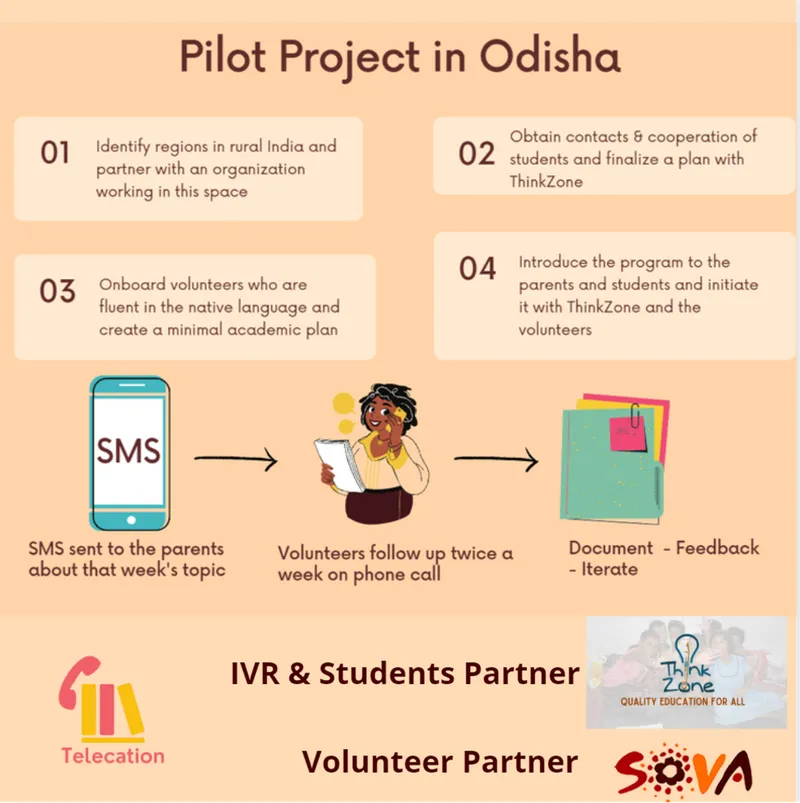
Infographic by the team briefing the phases of the pilot project
The first phase — the research phase — happened in September 2020, where Project Telecation laid out the plan and also finalised the streaming of the pre-recorded sessions with IVR technology. It also onboarded NGO ThinkZone to work with it for the pilot.
In the second phase, that involved 'execution and onboarding' in October 2020, Telecation sought to empower 100 students in the pilot project using IVR technologies, especially during COVID times.
“ThinkZone had an IVR number that it was using to reach out to students in its region. We decided to collaborate and work with the NGO to reach out to 100 new students as part of Project Telecation. Since ThinkZone works in Odisha, we had to identify volunteers who are fluent in the regional language Odia,” says Akin.
It partnered with SOVA (South Odisha Voluntary Action) through which they onboarded about 10 volunteers who were fluent in Odia, because of the dialect differences and ease of understanding to empower students.
The students belonged to the rural parts of Odisha, including Lalmunda, Kasamguda, Dhamnakunti, Khapuriguda, Narahandi and Teliguda, Michia, B.Dhargudi, Gangrajpur, Badagaon, and Podalguda.
From October to December 2020, Project Telecation executed its third phase of ‘execution and monitoring.’ Here, it reached out to the 100 students from Class 1 to 4, teaching them Mathematics and the Odia language.
The project also onboarded industry leaders to guide the Project Telecation team in its efforts. Apart from the Kathmandu Living labs, the project is mentored by Himanshu Giri (CEO of Pratham Books), Mamtha Sharma (CSR Advisor for Corporates and Social Enterprises), Shailaja Sampath (Storyteller and Child Activist), Beula Anthony (Programme Manager at Community Radio, Radioactive 90.4Mhz), and Krati Gahlot (Programme Manager at the Barefoot College International).
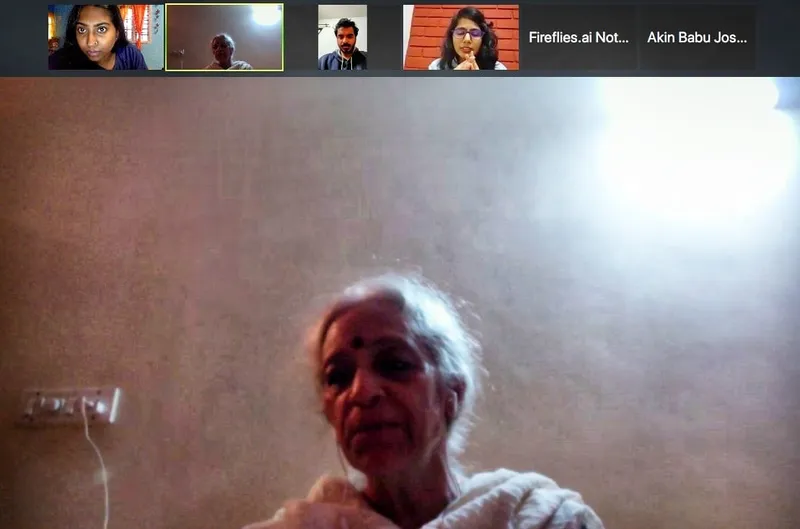
One of the mentoring sessions with Mamtha Sharma
“With consistent virtual mentoring sessions, we learnt the nuances of creating impact at scale, while learning from them the practical aspects of social entrepreneurship, especially in such testing times,” Akin shares.
It conducted its last phase 'Pilot project completion and evaluation' in December 2020 - January 2021, where it focussed on wrapping up the project and noting down all the key findings.
“With the help of the two NGOs, we gathered insights and data on the project and its outcomes. These results and the overall impact of the project is currently put together for the final completion, scheduled for in the first week of February 2021. The completion will see participants from five countries, including India,” says Akin.
Project Telecation’s impact
“In the pilot project, we have impacted the learning outcomes of 100 children. Over the next few months, we plan to extend this project to other parts of Odisha, and eventually, nationwide,” Shruthi says.
At present, the project is bootstrapped and has clocked an expenditure of Rs 50,000. The lion’s share of the cost was used to pay for IVR technology, which was quintessential in setting up the infrastructure necessary for the implementation of toll-free over-the-call classes that can help the students access the classes.
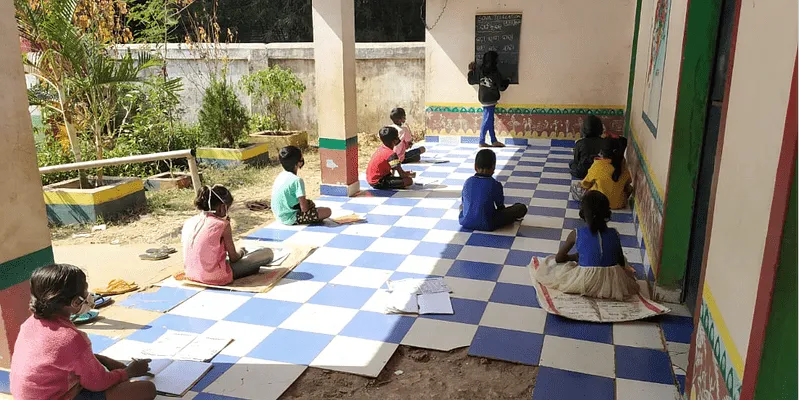
Classes conducted by Project Telecation with the help of ThinkZone.
Like every new initiative, co-founders of Project Telecation, too, faced with challenges on their journey. The members say that drafting a formal Memorandum of Understanding (MOU) with ThinkZone for conducting the activities, was an experience not shared by any of the team members. However, with the help from KLL and online resources, they were able to overcome it.
Besides, a lack of monetary incentives and the high call drop rate proved major hurdles, where NGO SOVA helped the team with the smooth sailing of things.
In fact, when some parents were unable to afford recharges for their phones, it was solved by a combination of physical classes wherever possible, through sharing of mobile phones, and starting group learning among students who lived in the same vicinity.
The road ahead
Speaking about Project Telecation’s future plans, Rahul says, “A more focused group of volunteers recruited, specifically for translation, may help in breaking the language barrier. Further, another set of volunteers may also be recruited for developing academic content, thus, helping the team analyse weekly student reports generated through excel sheet records, etc. This can help in continuously improving the audio lectures.”
For the same, it plans to arrange for a masterclass on Excel/Website development/storytelling or other skills for the volunteers. It also plans to focus on raising more funds for the project with the help of organisations that can help connect the team with potential donors.
Importantly, moving forward, it will try to improve social distancing between those students who share a phone.
“A feasibility test by a couple of volunteers was done to check the above ideas, including some physical classes. These were quite successful, and could complement audio classes by the rest of the volunteers in the future,” says Shruthi.
Right now, the team is looking at winning the competition after which they further plan to take forward their project. In fact, they also want to help the volunteers with a small stipend for all their tireless help.
Edited by Suman Singh


